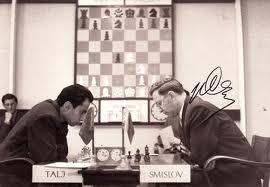
Positional or Tactical Chess?
Probably all chess players ask themselves at some point of their chess career: "Am I a positional chess player or a tactician?" Based on the answer to this question they choose openings and the general strategy of their games. But if you say that it doesn't really matter, then you have a point since as a well known chess saying goes: there are no positional and tactical chess players, there are only good and bad chess players!"
What made me write this article is the usual situation when a very inexperienced chess player, practically a beginner, starts the game with 1.d4, 1.c4 or 1. Nf3. I face this situation almost on a daily basis and I need to explain to my students that they shouldn't play these kinds of openings. Don't get me wrong, I like all of them and if you check the database, you'll see that I have employed exactly these openings during most of my chess career. So, why do I strongly advise inexperienced chess players against these perfectly normal moves?
Usually it goes like this: my student plays 1.Nf3 and when I ask him why he chose this particular opening he says: " Well, I think I am a positional player, my style is similar to Kramnik's, and this is exactly what he plays". My usual thought in moments like this is: " You are am 1100 player for God's sake! Before you talk about being a positional or tactical chess player you really need to learn how to play good chess first, and the best way to learn it is to play open positions which start with 1.e4!" Then I try to explain to my student that it is not a coincidence that the majority of the great chess players started their chess journey by playing 1.e4. Later they might switch to the closed openings, but at first they played all kinds of sharp lines which really improve your tactical skills and teach you how the pieces cooperate with each other. Just look at the games played by future World Champions.
Mihail Tal was 13 years old when he played the next game:
You may say that this is what Tal was famous for, he played like this his whole life including the time when he became the World Champion. Good point! So, let's take a look at the games played by future World Champions who were known as positional chess players.
Vassily Smyslov was 14 years old when he played the following game:
Vladimir Kramnik was just 9 years old when he played this game:
It was an absolutely crazy game. It is difficult to imagine that the same kid who played White later got the nickname "Drawnik".
Finally I don't want you to think that 1.e4 is the only way to play for young chess players. True, it is the easiest way to get a sharp situation on the board, but if you have a desire to start 'fire on board', then almost any opening will do!
Jose Raul Capablanca was one of the finest positional chess players in chess history, but look at how he attacked when he was 13 years old:
Capablanca's comment when he was already the World Champion is very instructive: "Today I would most probably play a simple move 29. Qd2 which was also enough for a win." But this is the whole point, young chess players should try their hand in sharp, complicated positions first and only then try positional chess.
It was very common in the countless chess clubs of the former Soviet Union that coaches taught their young students to play gambits, sharp openings like the Greco Attack and the Sicilian Dragon. My recommendation for all my readers whose rating is about USCF 1300 or below: try to play open sharp positions as much as possible. Even if you play 1.d4 or 1.Nf3 go for complications whenever possible! Only a chess player who is proficient in tactics can be a successful tournament player. Don't forget the popular saying that "chess is 99% tactics". Don't be discouraged if you lose a game or two, the most important thing is to learn how to calculate variations and visualize a position, and you learn it best in sharp open positions!
Good luck!






